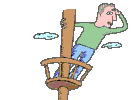Article # 2: Guidance - Who Needs It?

We have all tried to be our own guides, to do it all by ourselves. The results have often been disappointing. That old adage, ' if you want it done right then do it yourself ', just simply does not work most of the time. It is an approach that fosters separation.
If we rely solely on ourselves, we are reinforcing the idea that we are separate from one another. One of the reasons there are so many of us here on the planet is that we may be of assistance to each other.
The captain of a ship is the top dog, the big cheese, the one in charge, the one who is ultimately responsible.
When the captain of a ship enters a port, the captain brings aboard a pilot, one who knows the way to safely maneuver the ship into port. The captain remains in charge but temporarily uses the knowledge and experience of a pilot, a guide, to ensure the safety of the passengers and ship.
You and I are each captains of our own ships. Each one of us is the top dog, the big cheese, the one in charge, the one who is responsible.
You and I have the option of seeking guidance when we are faced with an unknown situation. This guidance may come from a number of different sources, a book, a magazine article, another person, a group of people, a walk in nature, climbing a mountain, an inspiration from Spirit.
There is a remarkable directive that says something like seek and you will find, ask and it will be given, knock and the door will be opened. (New Testament: Book of Mathew)
A significant concept here is that first we must acknowledge that we do not know the answer to whatever question or issue or problem we may be facing. Once we admit this, we are in a position to look for the answer.
Dr. Albert Einstein has been quoted as saying the solution to a problem will not be found by the same level of thinking that has observed the problem.
We are the Observer, the issue or problem is the Observed. By the power of the focus of our minds, Observer and Observed are one. They are seen as cause and effect, both appearing on the same level of mind. Cause and effect are one, united. Hence, Observer and Observed are one, united.
As Observers Observing a problem, we will see ourselves as united with the problem. This focus establishes a brick wall between us and the solution. We must find a way to rise above this separation. Instead of Observing the problem, we must find a way to Observe the solution.
The answer we seek will not be found by the same level of thinking that we have used in observing the issue.
If we truly seek the appropriate answer, we must somehow shift our level of thinking from observing the issue to a level of thinking that invites the answer into our awareness. We are really talking about two levels of thinking; one level that observes the problem, the other level observes the answer.
As long as we stay on the level of problem-observing, we will tend to attract more and more problems into our consciousness. We finally become overwhelmed with problems, feeling totally inadequate and un-worthy to meet the challenge. This is something we have the power to stop, something we must stop. It is a vicious cycle of problem-thinking that allows not one bit of solution-thinking to come through.
The level of thinking that observes answers has a vast array of channels through which it may seek various ways of guidance, be it through reading, talking, activity, meditating.
A key point here is that we must first acknowledge that we do not know the answer. The second point is that it is our intention to invite the answer into our awareness; to seek, to ask, to knock on the door.
The mind functions between two levels, one level has questions, the other level has answers. As we are developing the use of our minds, we are building a bridge from problem-observing to answer-observing, moving from the questions to the answers.
The next article in this series will deal with the mind.